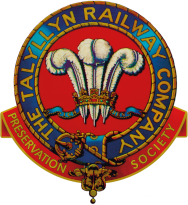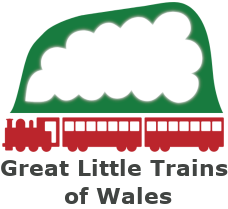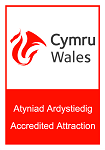MINUTES OF THE 54th ANNUAL GENERAL MEETING OF THE TALYLLYN RAILWAY PRESERVATION SOCIETY
Held at Neuadd Pendre Social Centre, Brook Street, Tywyn, Gwynedd on September 25th, 2004
On the platform were Richard Hope, Vice-President, TRPS, and Director, TR Co, in the Chair; Don Newing, Chairman, TRPS; Keith Theobald, Chairman, TR Co; Colin Roobottom, Hon. Treasurer, TRPS and Accountant, TR Co; John Robinson, Hon. Secretary, TRPS and Secretary, TR Co, and MRFS as Minute-taker. There were 178 members present. Richard Hope opened the meeting at 3.30p.m., explaining that he was standing in for President Christopher Awdry, who was celebrating his silver wedding in Austria. Richard asked the meeting to stand for a minute’s silence in memory of Vice-President John Slater, long-time AGM Minute-taker, and all the other stalwarts of the TRPS who had died during the preceding year.
1. Apologies
Apologies had been received from the President Christopher Awdry, Vice-Presidents Jeremy Wilkinson and Dai Jones, Managing Director David Mitchell, recovering from a hernia operation, and four other members.
2. Minutes of the 53rd AGM
The Minutes of the 53rd AGM of the Society, held at Tywyn on September 27th, 2003, having been circulated to members of the Society at that date, were proposed by Richard Hope to be taken as read.
Mike Davies felt that the minutes significantly differed from what he had actually said on locomotive liveries in item 12; he proposed that the words “it was time to revisit this resolution.” be replaced by “stated that Council needed to put a proposition to the next AGM, probably the same one as before, give people a chance to think about it and whatever that meeting decided should be the policy.” In addition he felt that John Robinson had been misrepresented in the following paragraph and proposed that “He felt some sympathy with Mike’s views on the specific example” be replaced by “He felt a degree of sympathy with Mike’s viewpoint as far as the subject of locomotive liveries was concerned”. Richard Hope gave his assurance that the minutes would be so amended. They were then agreed without dissent and subsequently signed as being a true record.
3. Matters arising from the Minutes
There were no matters arising.
4. Election of President
Richard Hope asked the meeting to endorse the Council’s nomination that Christopher Awdry be elected President. This was agreed without dissent.
5. Election of Vice-Presidents
Don Newing took the chair and John Robinson read out the names of those proposed for election as Vice-President. The following were elected en bloc: John Bate, James Boyd, Pat Garland, Alan Holmes, Richard Hope OBE, Dai Jones, Winston McCanna, Major P M Olver OBE, Sonia Rolt, Roy Smith, Don Southgate, Jeremy Wilkinson and Maurice Wilson.
6. Appointment of Auditors
The appointment of Silver & Co as the Society’s Auditors was proposed by Bob Cambridge, seconded by Michael Howard and agreed by the meeting. Peter Silver thanked the meeting for re-appointing his firm.
7. Election of Honorary Secretary
John Robinson had been nominated in accordance with the rules, this was seconded by Richard Hope and agreed without dissent.
8. Election of ten members of Council
John Robinson read out the names of the fourteen candidates and those present stood to be recognized. The ballot papers were then collected. Later in the meeting Peter Silver announced the results of the election: 202 papers had been completed, 1646 votes being cast as follows: Peter Austin 135, Phil Guest 164, Bill Heynes 142, Ian Hopwood 43, Michael Howard 62, Gareth Jones 163, Lis Mann 165, Phil Sayers 165, John Smallwood 179, Nick Smith 126, Keith Theobald 166, Tony Thorpe 136. Mrs Mann and Messrs Austin, Guest, Heynes, Jones, Sayers, Smallwood, Smith, Theobald and Thorpe were declared elected.
9. Reception, Approval and Adoption of Reports
Don Newing presented the report of Council for the year ended 31st January, 2004. Following custom he gave an update on the situation, noting that he would leave Wharf Redevelopment to Peter Austin. Don thanked all those involved in returning No. 4 Edward Thomas to traffic. 2004 had been a busy year for special events. The Rolt Rally had been held again. Owing to the redevelopment at Wharf both “Duncan Days” had been held at Abergynolwyn; they had been a success there, so it could well become the preferred venue. Race the Train and the Have-a-Go Gala had been held, building upon the success of previous years. Don also noted the welcome return of the Young Members’ Group Carriage Push, raising almost £1,000. Don stressed the prime importance of the “youth” on the Talyllyn; all too often he heard at Heritage Railway Association meetings that other railways were suffering from a shortage of younger members and he was overjoyed that this did not apply to us. Don also praised the work of Brian Owen as the curator of the Museum, cataloguing and interpreting the varied collection. At Don’s behest Brian stood to be recognized and was warmly applauded for all his hard work.
Colin Roobottom then presented the 2003 Financial Statements. Again he spoke to the present situation, reminding everyone that there was still plenty of scope for further contributions towards Wharf. The purchase of a virtually new boiler for No. 4 had been funded from grants and donations. Colin commented on the usefulness of Talyllyn Holdings in raising funds; over £80,000 in grant aid had been paid to the Railway Company already. Holdings’ money attracted a preferential rate of interest so further installments of the grant would be transferred only as the need arose. Don Newing then announced that for the year to date passenger journeys were 3% down and anticipated revenue 0.5% down; Shop takings were 10% down, largely due to opening a month later than last year.
Richard Hope invited questions on the reports.
Ivor Kelly noticed that the “Other Creditors” In the Company accounts had increased by £124,000. He wondered why, though believing part of it was grant from the Narrow Gauge Railway Museum Trust. Colin Roobottom replied that most was indeed a payment from the NGRMT before the end of its accounting year, which at the Company’s year end had still to be spent on the redevelopment project.
Chris Parrott wondered why no Catering figures to date had been announced. Don Newing explained that owing to David Mitchell’s recuperation he had needed to acquire the figures at very short notice, and had been unable to get those. Mike Davies was amazed that the Chairman of Council needed to run around for the figures; they would have been produced as a matter of course for the Chief Executive and he felt most strongly that they should have been available for this meeting. Keith Theobald promised that the situation would not recur next year, and that he would make the current figures available as soon as possible.
Michael Howard queried the background to the increase in the staff catering subsidy. Colin Roobottom explained that it was essentially due to “more volunteers eating more”. Michael felt that this was a good politician’s answer, but he wanted to know how the figure was computed; over the years several people had expressed concern that it seemed to be a fairly arbitrary figure, which increased every year and might distort the Catering Accounts. Colin answered that the subsidy was the difference between the public price and the discounted staff price, computed by the cash registers.
George Gardiner spoke at length, to the accompaniment of a bowl of cornflakes being eaten with purchased milk, commenting that the subsidy equated to a vast mountain of sandwiches and a veritable lake of tea. He felt that the figure needed to be more accurate so the nature of the subsidy could be known. The Catering Sub Group was aware of the situation but needed to know where the profits and losses occurred. Sue Whitehouse asked George to repeat what he had said in twelve words or fewer as she had lost the thread.
Richard Hope commented that the platform was aware that this was an area in need of clarification.
Phil Guest asserted that the figure was a complete “red herring sandwich” as it covered coffee, tea, milk and sugar as well as sandwiches. He felt that the figure did not need to be expressed, it being a red herring that had repeated itself over many years. Chris Price disagreed, feeling that it should still be shown as it was the difference between two profits: the public profit and the volunteer profit. In his mind it was still a “red herring sandwich”, albeit with a little bit of mayonnaise on the top.
Andy Statham proposed the adoption of the Report of Council and the Financial Statements of the Society for the year ended 31st January, 2004; this was seconded by Ian Howitt, and agreed without dissent.
10. Wharf Redevelopment
Peter Austin bounced on to the stage to present his report, detailing the trials and tribulations that had bedevilled the project: the lowest tenders had been 40% higher than our original costings; one of the three formal planning permissions had not been granted until April 2004; the grant of £147,000 from the Wales Tourist Board had needed to be ratified by the Welsh Assembly Government and the grant body had then imposed thirty-three extra conditions so that the first grant claim had only been raised at the end of July; Network Rail engineers had vacillated over the effect the building work would have on the wing wall of the Neptune Road bridge, which stood on Talyllyn land. HLF administrators had given permission to start work in July 2003, but subject to preconditions which could only be met in early 2004. Main construction had started on 12th January to be completed on 12th July. Early on, the ground was found to be less stable than expected, leading to a long delay whilst the foundation plan was redesigned. Watkin Jones, the main contractors, were essentially managing agents and much delay was caused by their inability to attract sufficient skilled sub-contractors to complete their work on time. Operation of trains with the shortened platform and propelling of empty stock had been a success and the platform was temporarily restored to its original length for Race the Train and the following week.
Peter also announced that he had been advised by the main contractor on 24th September that the building’s construction should be complete by 22nd October, 16 weeks over the original schedule. The now-exposed back wall of the original building has been found to be in much worse condition than expected and it was intended that a local contractor would be employed this winter to refurbish it. He closed his report by formally thanking the Heritage Lottery Fund, the Wales Tourist Board, the Welsh Development Agency and the Welsh Assembly Government for their grant funding towards the second phase, together with the many members and friends who had raised almost £450,000, and finally Margaret Austin for her patient, understanding and tolerant nature.
Chris Parrott was relieved to see the redevelopment taking place at long last but appalled at a 16-week over-run on a 26-week project, he wondered what steps were being taken to recover the extra costs incurred. Peter Austin replied that the additional costs had been separated and that area was under review in confidence. John Bate commented that the back wall was exactly as he had supposed. He was also surprised that the initial surveys had found the ground to be good; he had gathered from work in the 1970s that there was made ground. Chris Price spoke to support John, remembering comments John had made over the years, and further asserted that there were many people present at the meeting who had very publicly pooh-poohed everything John Bate had said at the time.
John Smallwood did not quite agree, remembering a conversation with John Bate during the first phase of the redevelopment when John commented upon finding a concrete and rail support at the East end, saying “you wait until you see what is at the other end”. However, neither John Smallwood, nor anyone else, had expected the back wall to be in such a bad condition.
George Gardiner wondered if any thought had been given to the ongoing running costs of the new building in the years to come. Peter Austin retorted with “Yes”. He added that nothing had changed from the business plan written a year ago.
Robert Prosser congratulated those involved for their efforts with the new building but was perturbed by the loss of gas lighting on the platform and the use of fluorescent lighting in the café of a heritage building. Peter Austin declined to comment. George Gardiner wondered why. Peter replied that the design process had been under way since 2000; George wanted him to criticize actions in the past and others still under negotiation; Peter very firmly stated that he had no desire to do so.
Chris Price wondered if George Gardiner wanted the new building torn down so we could start again.
Lawrence Garvey did not wish to criticize, but in his professional capacity he found it amazing that the details of the internal fitting out were not finalized at the design stage.
Gareth Jones was disgusted at the negative tone of the questions, feeling that we should be glad with what the Railway would soon have; he personally thanked Peter Austin and this was greeted with thunderous applause.
Richard Hope closed the debate by commenting that Wharf Redevelopment was not an easy project and by dint of being grant funded it was not entirely under our control.
Keith Theobald opened an appeal in memory of John Slater, announcing that the Education Room in the new museum would be dedicated to John, in recognition of all the teaching he had done to all age groups about the Talyllyn Railway over the years. Alan Holmes queried why the envelopes for donations were printed “Golden Jubilee Appeal”, Keith responded that they had been printed before the decision had been made; he assured everyone that all monies collected would be directed to the memorial appeal. A collection was then taken which raised £1,062 (including the anticipated tax refund under the Gift Aid scheme).
11. Locomotive Livery Policy
Don Newing presented the policy as outlined on page 26 of the September Talyllyn News and invited comments. MRFS congratulated him on writing a very dangerous document, an awkward half-way house that neither defined the liveries fully enough to stop an individual painter exercising too much free will nor gave the membership a choice; he was going to vote against this policy in the hope that it would be re-presented next year as a range of options. Mike Davies agreed absolutely; he was very disappointed with what Don had written, which was not what he requested at the previous AGM as evidenced by the correction to the minutes. All present should be entitled to a vote on subjective matters like loco liveries; no specialist knowledge was needed and many people cared about them. He too would vote “No” to this policy, not because it was appalling, but because it did not give the membership a choice. Members needed to have something before them to vote upon, and he would write to the December News to get the discussion going. It was impractical to table amendments at the AGM. His letter to the June Council meeting expressing a broad range of options had been rejected with the cheery rejoinder to “bring it up at the AGM”. Mike took exception to the phrases “with the approval of Council” and “at the discretion of Council” in Don’s proposed policy, feeling that such matters should be decided, not by 20 people, but by the 200 present in the hall. He made an impassioned plea to those present to vote against the policy, asseverating that a choice should be presented next year.
John Robinson read out the written suggestion from Gordon Rhodes (on duty at Quarry Siding) that No. 1 should be painted red, 2 light blue, 3 pink … Muffled titters arose from the floor as members recognized the colours used on the Train Graph, Gordon wishing to help Control Assistants in identifying the engines.
Ian Howitt registered his indifference, caring less about the colour of engines than whether the paint stopped them going rusty. George Gardiner wondered if we could follow some public transport undertakings and paint engines in the corporate livery of sponsors.
Russell Prince asked why MRFS had not been contacted for the advice he had offered at the last AGM.
Bill Heynes opined that the membership should be given a choice in this matter, as in selecting a name for No. 10.
Mike Davies proposed that the matter be deferred until next AGM, and that a range of choices should then be put before the membership. MRFS willingly seconded the proposal, Richard Hope put the motion to the meeting and it was carried.
12. Miscellaneous announcements
Walter Crowe announced the election results for the Traffic & Operating Committee. There being only enough nominees for the vacancies he declared Walter Crowe, Pippa McCanna, Alastair Ribbands and MRFS elected for the Traffic Department; John Burton, Martin Fuller, Bill Heynes and Philip Higginson elected for the Locomotive Department.
Chris Parrott introduced his new book on El Tren del Fin del Mundo, inviting Maurice Wilson on to the stage to be presented with the first copy of the book as a token of thanks for opening the door of opportunity to him in Argentina. Maurice thanked Chris for his appreciation and was overjoyed that both he and Shaun McMahon had benefited from their experiences together in Tierra del Fuego. Copies of the book would be on sale after the meeting at a 10% discount and the author would donate 50p each to the Wharf Redevelopment fund.
Lawrence Garvey plugged the Midland Area Group Christmas dinner, which would be held on 7th December at the Birmingham Repertory Theatre. He also appealed for help at the Warley Model Railway Exhibition to be held at the National Exhibition Centre over the preceding weekend.
Tony Randall advertised Steampipes, which would be held on 8th December at the Friends’ Meeting House near London Euston Station.
Keith Theobald reminded members that Outdoor Weeks were advertised in the News. As always additional volunteers would be warmly welcomed and work would be available to suit everyone.
Bob Morland reported that the sale of his prints had raised £180 for Wharf Redevelopment, he had more available this year and he promised to try to avoid photographing Bill Heynes.
13. Other Business
Michael Howard expressed his concerns about the recording of membership card numbers when free tickets were issued, fearing that this was designed to lead to a curtailment in members’ travel privileges. Mike Davies retorted that the feelings of the membership had been made quite clear when this had been raised in 1994; he further took the view that the restriction of free travel on certain peak trains this summer had been technically unconstitutional, and, although a valid response to unique circumstances, should not be seen to set a precedent. Michael Howard wished those present at the meeting to express their opinion on the matter of free travel but there was no response from the floor.
Lawrence Garvey commented that up to Spring Bank Holiday members had comprised 17% of passenger bookings, and at the price of two round trips membership could be abused as a “season ticket”. George Gardiner suggested that travel concessions should be available to working members and holders of valid grade cards. Chris Price whimsically suggested that full adult membership could be increased to £80.
Richard Hope terminated the discussion by pointing out that any Constitutional amendment had to follow the procedure in Rule 25 and be approved in accordance with Rule 24.
Mike Davies suggested the possibility of “open” council meetings, with members allowed to observe non-confidential business. He proposed taking a consultative vote from the floor. Don Newing was against the proposal, commenting that it was difficult enough getting through the business on each agenda without the distraction of other attendees. Chris Price seconded Mike’s proposal. Gareth Jones welcomed the suggestion, being familiar with the concept through his work in local government, and suggested a trial of the idea. Andy Lawton also supported the idea.
A vote was taken and was strongly in favour.
Noel Williams reported that the Talyllyn Tote was now donating £100 per month to the TRPS.
David Williams spoke on behalf of the photographers attending his charters, thanking all those who had worked so hard to make them a success, particularly Tony Bennett, the “Guardian of the Daffodils” at Rhydyronen. As a measure of his thanks he donated a sack of daffodil bulbs to replace any of Tony’s charges that had been fatally maimed by photographers.
Peter Austin presented the painting that was displayed before the top table, announcing that he would take sealed bids for its purchase rather than delaying the meeting with an auction.
Don Southgate remarked that he had been attending Annual General Meetings for over forty years and the same old arguments kept returning; he hoped this would long be the case!
Don Newing commented on the atmosphere of the Talyllyn, comparing us to one big happy family. Some members became involved and interested at a very young age: one member had been interested in the Railway since he was four years old, even undertaking a sponsored bike ride for the TRPS; he had later “graduated” from Tracksiders to become an operating volunteer and had requested Life Membership from his father as an 18th birthday present; doubtless he thought that forgotten. Don asked an exceptionally surprised David Martin to take the stage, to be presented with his Life Member’s card to warm applause.
Jane Garvey reminded the meeting of David Leech’s promise in about 1990 to eat any Portakabin remaining at Wharf after 1995; with the redevelopment in full swing she produced a cake in the shape of a portable building and asked David to ceremonially cut the cake and eat the first slice. Subsequent pieces were sold later at 50p generating a donation of £65 to Wharf Redevelopment.
There being no further business, Richard Hope declared close of play at 17.30, the meeting having lasted 2 hours and 12 seconds.
Catering Results
The above minutes accurately record some concern at the unavailability of year-to-date figures for Catering takings. These had in fact been prepared by the Catering Manager but not collected by the platform party for the meeting. The comparisons with the equivalents for 2003 were: Wharf -9.0%, Abergynolwyn +0.1%, staff sales +7.5%.








